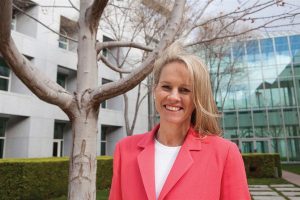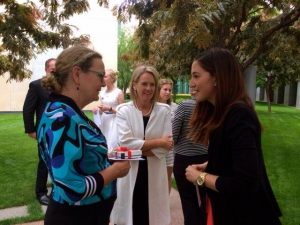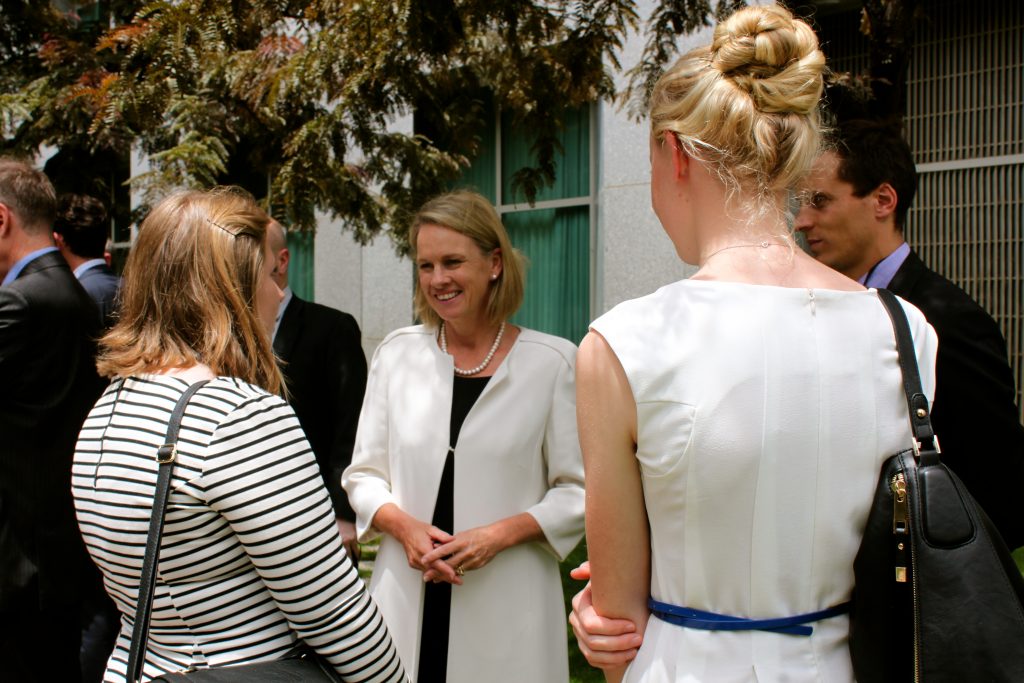Happy International Women’s Day – a day that spotlights gender equality and celebrates the contributions of women around the globe! This year’s theme, #MakeItHappen, is encouraging effective action. So, in the spirit of ‘leaning in’ and going after our goals, Country to Canberra is posting its first-ever ‘Empower Profile’. These profiles will feature inspiring women and girls who are making waves and promoting empowerment in rural Australia.
For our first Empower Profile, we were thrilled to interview Country to Canberra supporter and Assistant Minister for Heath, Senator Fiona Nash. Having represented NSW for a decade, Minister Nash is passionate about helping young women succeed.
Our founder, Hannah, caught up with the Minister to learn what life is like as a female, country politician.

It’s International Women’s Day! How have you been celebrating?
I’ve been doing some events around regional communities, lunches, and talking to local women in regional towns about women in business, about women in politics and it’s been really interesting! The tagline for International Women’s Day is ‘Make It Happen’ and I think that’s something we’ve all been talking about: that often sometimes women don’t’ feel like they have the confidence or the qualifications to get out there and do what they want, so I’ve really been saying just make it happen. One of the things that I’ve found most interesting and one of the best parts of the job is actually getting out into regional communities, into businesses, into the main street talking to people about the issues that are most important to them. So, that’s how I’ve been celebrating International Women’s Day.
Take me back and tell me a bit about your background. How did you end up living in country NSW?
I actually grew up in Sydney til I was 16. When I met my husband and we got married, which was 25 years ago, we moved out to Young (in rural NSW) for a job. He was working on a farm out there and he’d been working on a dairy farm prior to that. A couple of years after that, with our parents, we bought the property we’re on now and we’ve been there ever since!
So, why did you get into the political game? 
Lots of late night dinner parties complaining about things 20 years ago! [Laughter] Thinking well, if I am going to complain, I should be prepared to put my hand up and get involved. So, I joined the local branch of the National Party and that’s where it all started.
What are some of the challenges involved in being a rural politician? I’m imagining lots of driving!
[Laughter and sighs] Ahh lots of driving, lots of miles, lots of travel. That’s probably one of the big differences between a city MP and a country MP; their patch is so much smaller. Being Senator for NSW, and indeed some of my lower house rural colleagues, we have massive electorates. So that sort of tyranny of distance really exists for everyone in rural Australia, and that’s one of the biggest challenges for rural people in general. That certainly applies to me as well. Then of course it comes to balancing work and family, time away, and those types of challenges as well.

Societal discourse about gender equality seems to be increasing but we don’t spend a lot of time focusing on rural girls. What do you think are some of the main struggles faced by girls living in regional and rural Australia, and what can we do to overcome them?
Access to education, particularly tertiary education. Again, we’ve got that tyranny of distance. We’ve got young girls (and blokes as well, but we’re talking about girls at the moment) finding it difficult to actually access tertiary education. One of those challenges is simply the requirement of having to move away from home to attend Uni: there’s not one on the doorstep like there are for city girls so I think that’s a real challenge. It’s terrific to see so many of the regional Unis doing a brilliant job and I think they’re fantastic, but I think that’s a real challenge. Sometimes for young regional women, if they’ve got a path they want to tread that’s different to their peers, as they’re growing up it can be more of a struggle when you haven’t got people around you that are headed in the same direction. Sometimes that support for young girls is missing when they’re aiming at that’s not something necessarily something that many of their peers are doing. I think that can be a struggle and they can feel a bit isolated.
 Noting that the theme if IWD 2015 is #MakeItHappen, if a 16-year-old girl came to you, saying she wanted to be a politician, what would you tell her?
Noting that the theme if IWD 2015 is #MakeItHappen, if a 16-year-old girl came to you, saying she wanted to be a politician, what would you tell her?
First up, ‘go for it’! Then I would talk to them about what they actually needed to think about to get to that point. Whenever people ask for advice about getting into politics, I say ‘do everything you can do to get there if that’s what you want, but don’t change your life path’ because I’ve seen so many people who have been focussed and working toward thinking they’re going to get into politics, and it doesn’t happen and then they’re devastated. They might’ve changed their job, they might’ve changed where they lived. So I always say ‘look at a potential career in politics in parallel with what your life path ever is’. Then, it’s a case of getting involved in a political party, learning from the grassroots what their party of choice is all about, and just being prepared to be involved and do the hard yards. These things rarely happen overnight it takes a lot of work, but at the end of the day it’s very rewarding when you can be in parliament, be involved and make changes for the better for people, which is really rewarding.
Lucky last, on this International Women’s Day, who is your female role model?
That one’s easy: that would be my mother. Unfortunately she has passed away now but my mother was an absolute trailblazer. She was a doctor – a GP – and she practiced for nearly 50 years (it might have even been 50 years). She was at Sydney Uni, doing medicine the year after the war finished, so that was 1946 when she started. She had a fantastic photo showing her open intake the year after the war – there were hundreds of people in this photo doing first year Uni and there were just 5 or 6 women in the photo doing medicine.
She always worked incredibly hard and did amazing things for people. She was a wonderful doctor and the community loved her. She was just really smart and clever and very, very wise. So my role model was definitely my mother.

